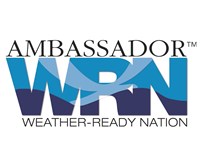What to Do
Disasters occur when natural hazards (e.g. hurricanes, tornadoes, earthquakes) or manmade threats (e.g. dam failures, bomb threats, airplane crashes) disrupt social systems. Disasters are taxing on communities and responders. In the early stages of a disaster, you may have to take care of yourself and those around you without outside assistance. While we hope you never experience a disaster, if you do, you need to be ready! Preparedness involves any action taken to increase your ability to respond when disaster strikes. By being prepared, you can build a more resilient community.
Be Informed
It is hard to respond properly to an emergency if you do not know one is happening. Take the time today to sign up for the emergency notification tools available to you so you can recieve important alerts.
Click here to learn about the alerts available to you and how to sign up for those systems.
Another important step to take toward being prepared is to learn about the hazards possible in your area and what you should do if they happen. UD regularly assesses threats to the campus and documents these hazards in the UD Hazard Mitigation Plans.
Learn more about the hazards present in Delaware and what you should do if one impacts your area.
Make a Plan
As you take time to consider what disasters are possible in your area, you should also consider how you would respond should one occur where you live or work. You should take the time to ask yourself:
- How will I receive emergency alerts and warnings?
- Where would I take shelter if I needed to shelter during a disaster?
- What is my evacuation route?
- How will I communicate with my friends and family during a disaster?
Upon answering these questions, discuss them with your household and those you work with. After discussing, you should document anything you may not remember. Keep a copy of this document with you and share a version with your loved ones. Remember, having a written plan is not your ultimate end goal. The most important part of making a plan is simply thinking several possibilities so you would be able to respond and improvise when an event happens. Visit this link to access a fillable emergency plan.
Do you work on campus? Want to make sure your office is prepared for emergencies? Review this departmental emergency preparedness checklist. Share a copy with your coworkers and review with your team. Preparedness is important everywhere, including where you work!
Build a Kit
Imagine the power went out in your home or apartment for a couple of days. Do you have what you would need in your home? What if you were suddenly ordered to evacuate your home? Have you identified the things you need to take with you? Learn more about what items you may need and how to build a kit.
Get Involved
If you are interested in taking a more active role in preparing for, responding to, and recovering from emergencies and disasters, the following are active volunteer organizations that support communities in Delaware:
Community Emergency Response Team (CERT)
There are lots of ways to get plugged into emergency preparedness in your community. One of the best ways to get involved is to join a Community Emergency Response Team (CERT). CERT equips individuals with important disaster response skills such as fire safety, search and rescue, team organization, and other stills. New Castle County hosts a CERT and regularly facilitates training that trains participants in basic disaster response skills. Visit their website to learn more.
RespondDE / Medical Reserve Corps
RespondDE is a volunteer public health response program. Volunteers are given opportunities to participate in preparedness outreach other educational programs in local communities.Visit their website to learn more.
Volunteer Delaware
Volunteer Delaware, a State Office of Volunteerism program, connects Delawareans with service opportunities. Visit their website to learn about current volunteer opportunities.
Delaware Voluntary Organizations Active in Disaster (DEVOAD)
DEVOAD is a nonprofit organization that fosters connections and collaborations between other organizations in the State of Delaware that provide disaster relief services during large-scale emergency events.
Ready.gov
Ready.gov provides information and several links about the ways you can volunteer, donate, and learn more about disasters.
Training
FEMA offers a host of courses that are free and open to the public. These are offered online through their independent study platform, as well as in person, either at the Emergency Management Institute or another host location. The Delaware Emergency Management Agency also is home to its own all-hazards training program that hosts courses, workshops, and exercises that cover a wide variety of emergency management topics. If you are interested in learning more about the training and exercises offered by FEMA, DEMA, or the University of Delaware Office of Emergency Management, please contact us through the linked form.






